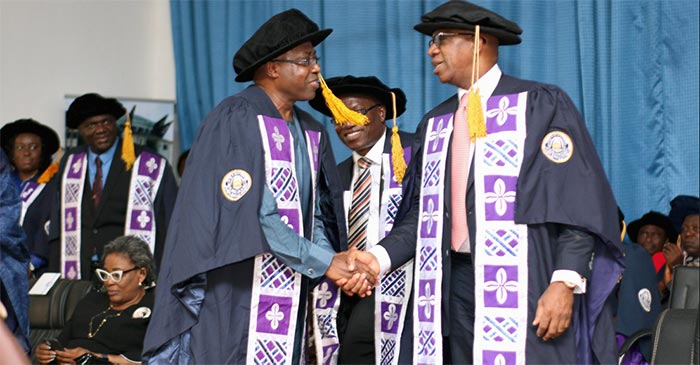Chronic underfunding of Nigeria’s tertiary institutions, particularly, those owned by the federal and the state governments, has been identified as the most fundamental factor promoting systemic corruption in the Nigeria’s Higher Education System.
The Provost, Anti-Corruption Academy of Nigeria (ACAN), Professor Olusola Akinrinade made this known while delivering the Convocation Lecture for the 28th / 29th combined Convocation Ceremonies of Olabisi Onabanjo University, Ago-Iwoye.
The Convocation Lecture entitled ‘The Integrity Imperative in Nigerian Higher Education: Towards Creating a New Normal’ took place on Friday, 31st January, 2020 at Otunba Gbenga Daniel Lecture Theatre.

While noting that corruption is by no means a peculiar phenomenon to Nigerian Ivory Towers, and can, as it is in other climes, be rightfully perceived as a reflection of the society. Prof. Akinrinade said it was nonetheless imperative to take concrete steps to address it because of its grave implications on the integrity and character components of the certification process.
He noted: “Corruption in any form is destructive to good governance and overall welfare of society. Corruption in the education sector is even more calamitous in terms of its negative impact on society.
“When the system is corrupted, public trust in higher education is greatly undermined, quality is compromised, values are distorted and unqualified young professionals are released into the political and economic life of the society.”
Akinrinade identified, based on a research he said was conducted in 2012, some education sector-specific areas where corruption was manifested. These included admissions, enrolment and registration of courses; examination administration and award of degrees; teaching and learning services and facilities; research and research administration; appointments, promotion and discipline of staff; and departmental administration and faculty governance.
He argued that where academic institutions were congenitally short of money and under great pressure to admit students, there would be an increased likelihood for corruption. The convocation lecturer further stated that faculty and administrators might be looking for ways to supplement woefully inadequate salaries in societies lacking other opportunities for employment. Akinrinade, therefore, submitted that many Universities currently facing difficult financial circumstances are more exposed to the lures of academic corruption.
He, however, contended that chronic, unaddressed funding problem was at the heart of the corruption in the system.
Institutions that lacked the required manpower and facilities, he argued, were prone to the temptation of cheating on accreditation by indulging in “what they consider necessary and in the best interest of their students, departments and of their institutions because it is an open embarrassment that affects the public rating of institutions when their programmes and departments fail accreditation.”
The Provost stated further that institutions cheated on accreditation not because they wanted to but simply because they lacked the resources and infrastructure to meet the requirements. He added that in most state and private Universities, funds were only released, if at all, when the institutions were facing accreditation.
According to him, that would be the time departments would be hurriedly making purchases of equipment and facilities that were required to meet the minimum standards. He, however, pointed out that the purpose of accreditation was to assess the facilities and personnel that were in place and in use when students were taught not what they newly acquired.
Therefore, Akinrinade concluded that there exist a high level collaboration between Universities, departments, their personnel and indeed the accreditors, at times, with the intention of cheating on the system.

